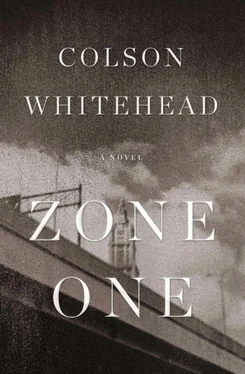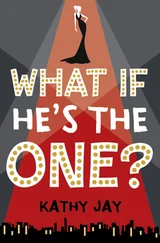It was after they opened the cellophane on the coconut cupcakes and crooned the mandatory song that Kaitlyn told them the Last Night story she had held back for so long. Hers was no numb recital; she did not tell them out of compulsion to indulge in the cheap catharsis of the Big Share. She told them to eulogize to the disaster. She said, “Let me tell you about the night I started running, and make a toast to the end of that race.”
He ran. Uncle Lloyd’s building reared up as he turned the corner, one of the garrison’s spotlights fixed on the sheer blue metal of its midsection. He flagged: What was it trying to tell him? He’d pressed his nose to the thick glass of airliner portholes for a glimpse of the building when he returned from a trip, sought its profile in the rows of skyscrapers when he was caught on one of the expressways that fed the metropolis, and when he finally rescued it from the crowd, its blue skin soaring over the bores never failed to cheer him. Each time he thought: One day I will live in a place like that, be a man of the city. Now the shimmering blue moon the spotlight punched out of the night sky was alien and unnerving. It was not the same building. It had been replaced. He ran through the ash, which was really coming down now, in his mind or everywhere, in slow, thick flakes that eased to the sidewalk in implacable surety. He was close enough to the incinerators that it was possible it was real ash. The Lieutenant was in that stuff, smithereened by the Coakleys.
The night of her birthday, in the Italian eatery, Kaitlyn explained that she booked the train even though it was more expensive than flying because there was so much of the country she had never seen. The invigorating virtues of the scenic route. While the world outside the windows was inspiring, the one inside the car was less so. Erratic shooting pains traversed her calves after three hours in her stiff seat, and the wifi whispered in and out so capriciously that she gave up on the half season of the lawyer show she’d intended to stream. The final queasy indignity occurred when a person or persons three rows back unleashed a sort of casserole salute to cheese that filled the car with a reluctant-to-dissipate stench, almost corporeal, another passenger. But her friends were waiting for her on the platform when she arrived for their reunion weekend, beckoning from beyond the metal barriers, where the steel-eyed German shepherds of the security teams chafed on their chains. Kaitlyn forgot the train’s farrago of torments until her pals returned her to the station three days later.
Her homebound train stopped outside Crawfordsville. The name of the town lilted in her brain all this time later, singsongy, the locale in a country-and-western song where the singer met her unexpected love, or lost it. The Sunset Dayliner did not budge, the lights stuttered, the circulated air loudly chugged on and off—a moment of turbulence, as if they had passed through a bad pocket. On the other side of this disturbance, one of the conductors hustled between the seats toward the front of the train, ignoring questions, eschewing eye contact, and mumbling in code to his crackling handset. A pair of Concerned Passengers huddled by the handicapped-access bathroom in consternation, and she heard the time-honored threat of the impotent consumer: I’m going to get to the bottom of this . They had God-given rights as paying customers, the phone numbers of corporate hotlines awaited in their smartphones, beckoned from the internet, consumer-protection apparatus listed helpful e-mail addresses to capture their appeals and apply remedies.
The woman in the window seat, a birdlike thing who hadn’t removed her beak from her tablet’s screen since boarding, looked at Kaitlyn for the first time as the static-y voice hit the intercom: We are being held here momentarily. The woman tugged the earbuds from their inputs in the sides of her skull. “Where are we, anyway?” she asked. Later, a national guardsman shot her six times in the back with a machine gun as she tried to make a break for the woods.
After the announcement, the first person on his feet was a fifty-something man garbed in a blue denim suit, his beard mashed through red-and-green beads. He tried to transfer to the next car; the door did not budge. They were locked in. An hour passed. The bars on Kaitlyn’s cell dropped one by one and the wifi shut off for good. Before the other passengers lost reception with their personal networks (in one sinister moment, a cascade of disappointment), the news blogs filled in what the conductor withheld: The train was under quarantine. A passenger had been “acting strangely” in the café car, attracting the attention of train personnel. After a scuffle, the terrorist barricaded himself in a bathroom and threatened to release a biological agent. “They have to let us out,” someone wailed. A woman shouted, and everyone in the car looked out the windows at the military trucks and jeeps, the soldiers spilling onto the gravel shoulder of the right-of-way in their white hazmat suits. Kaitlyn couldn’t see their faces.
The terror plot remained the cover story for the first couple of hours, plausible and self-organizing. Later, when Kaitlyn was on the run, she discovered what the rest of the country heard from the news media, before the news media was reduced to a numb scroll of rescue stations and an evanescent list of contradictory infection procedures. Before the media sighed into the depths, senescent, dumb. The train’s Patient Zero had turned feral in his seat—dropped out of humanity’s codes and into the solemn directives of the plague—and bit three people before being restrained; the conductor’s call for aid triggered a local military response. The authorities were on alert for certain keywords on the emergency channels, as it was early in the death of the world and the military still mobilized to distress calls. Some calls, anyway.
No one was getting off that train. On that Eve of Last Night, some of the passengers in Kaitlyn’s car tried to make a break for it—chute out the emergency window and sprint through a perceived weakness in the cordon. Thus did Kaitlyn first encounter that interregnum cliché, wherein the alpha male or female recruits support for a nutty plan and organizes the doomed sortie: pell-mell out of the surrounded Victorian; bursting from the collapsible door of the trapped school bus in a whirlwind of ad hoc truncheons, ladles, and chimney pokers. Out of the quarantined train car that had been plucked from its steadfast route and deposited forty-eight hours in the future, into the collapse. On the last night before the Last Night, the machine guns dispatched these intrepid; after that, it would be teeth.
When the soldiers suddenly bugged out the following evening—the armored vehicles spinning out into AWOL missions after loved ones or vain ops intended to keep it all from flying apart—Kaitlyn started running. She and the other passengers extricated themselves from the dead mass transit to master the new lessons, or else perished in their scattered elementaries. Eventually her run took her to Zone One, to Gary and Mark Spitz, the birthday celebration in the function room of an Italian restaurant, where on panels of dark wood the caricatures of the deceased regulars promenaded, famous and not famous, distended chins and knob noses protuberant and gross. Kaitlyn told them her Last Night story not to enter into ritualized mourning but to say: This is a story of how it used to be. When we didn’t know what was happening and were defenseless. Kaitlyn made a toast to Zone One and the new world they chipped from the stone, building by building, room by room, skel by skel. The intent of the caricature, Mark Spitz thought as he listened to her story, is to capture the monstrous we overlook every day. Maybe, she said, we can unsee the monsters again.
Читать дальше












